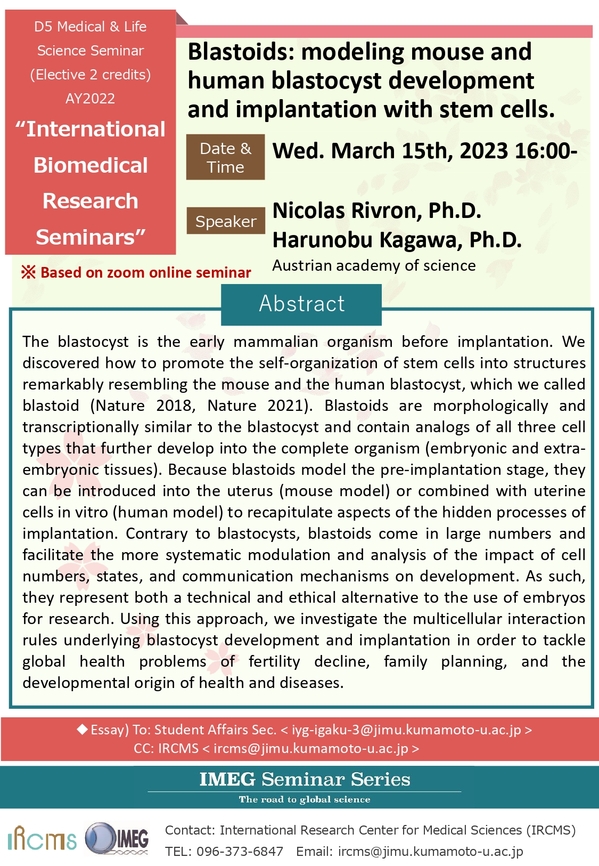Events
[Mar. 15] D5 Seminar-Dr. Nicolas Rivron and Dr. Harunobu Kagawa (Austrian Academy of Science)
February 13 2023
The "D5 Medical & Life Science Seminar" course will be offered by International Research Center for Medical Sciences (IRCMS). It will run from May 2022 to March 2023, with lectures given by scientists who are affiliated with IRCMS or in collaboration with researchers at IRCMS. The lectures will be given once a month, in English, and by leading scientists in the relevant research field. Students will be taught: 1) how normal physiological functions are maintained in the human body; 2) how these systems become abnormal under certain pathophysiologic conditions; 3) why stem cells are important in animal development and homeostasis; 4) how stem cell-based approaches can help us understand disease mechanisms and find potential cure for diseases related to stem cell malfunction (e.g., cancer, aging).
Anyone who wants to join is welcome.
For students who have registered for the course, please check your attendance in Moodle.
Date : March 15, 2023 (Wednesday)
Time : 16:00 -
* Zoom online seminar
Speaker : Nicolas Rivron, Ph.D. (Australian academy of science)
Harunobu Kagawa, Ph.D. (Australian academy of science)
Title:
Blastoids: modeling mouse and human blastocyst development and implantation with stem cells
Abstract :
The blastocyst is the early mammalian organism before implantation. We discovered how to promote the self-organization of stem cells into structures remarkably resembling the mouse and the human blastocyst, which we called blastoid (Nature 2018, Nature 2021). Blastoids are morphologically and transcriptionally similar to the blastocyst and contain analogs of all three cell types that further develop into the complete organism (embryonic and extra-embryonic tissues). Because blastoids model the pre-implantation stage, they can be introduced into the uterus (mouse model) or combined with uterine cells in vitro (human model) to recapitulate aspects of the hidden processes of implantation. Contrary to blastocysts, blastoids come in large numbers and facilitate the more systematic modulation and analysis of the impact of cell numbers, states, and communication mechanisms on development. As such, they represent both a technical and ethical alternative to the use of embryos for research. Using this approach, we investigate the multicellular interaction rules underlying blastocyst development and implantation in order to tackle global health problems of fertility decline, family planning, and the developmental origin of health and diseases.
Flyer: (Click to enlarge)

